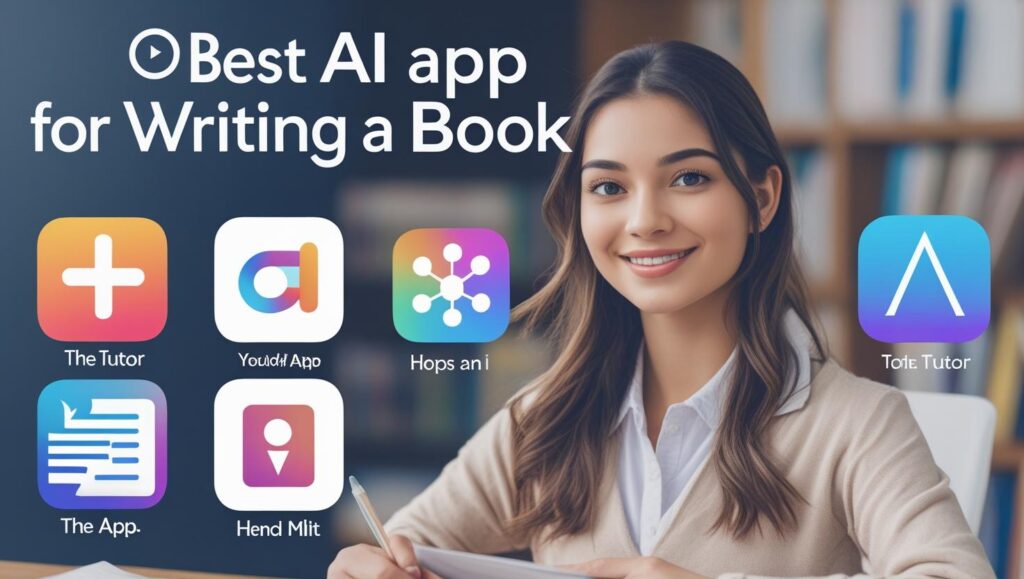Table of Contents
- Introduction
- 1. Generate High-Quality Book Ideas Using the Best AI to Write a Book
- 2. Structure and Outline Your Book Seamlessly with the Best AI Book Writer
- 3. Write and Expand Your Manuscript with the Best AI to Help Write a Book
- 4. Edit and Refine Your Work Using the Best AI Tool for Writing a Book
- 5. Format and Publish Your Book with the Best AI App for Writing a Book
- Conclusion: Master Your Craft with the Best AI Tools for Writing a Book
- Frequently Asked Questions (FAQs)
- Explore More: Recommended Resources for AI Book Writing

Best AI Tools for Writing a Book
Introduction
In today’s digital-first publishing world, more writers than ever are seeking ways to streamline their creative process, and many are turning to the best AI tools for writing a book. These cutting-edge technologies are revolutionizing how authors plan, write, edit, and publish their work. By integrating the best AI tools for writing a book into your workflow, you can increase productivity, maintain consistency, and enhance your overall writing quality without compromising your unique voice.
One of the most significant benefits of using the best AI tools for writing a book is how effortlessly they can support different stages of authorship. Whether you’re developing your first story idea or finalizing your manuscript for publishing, AI writing assistants are there to offer structured guidance, content suggestions, and real-time feedback. From novice writers to seasoned authors, many are now discovering that the best AI tools for writing a book can help break through creative blocks, offer new inspiration, and improve overall output.
The best AI tools for writing a book go beyond traditional grammar checkers. They can analyze story structure, help you outline chapters, and even suggest plot developments or character arcs. This level of intelligent assistance means you can spend more time on creativity and less time wrestling with writer’s block. Using the best AI tools for writing a book, you’re empowered to bring your ideas to life faster and more effectively.
But how do you know you’re using the best AI tools for writing a book? With so many apps and platforms on the market, it’s important to identify the tools that truly understand the needs of authors. The most advanced options offer natural language processing, content optimization, and seamless integration with popular writing platforms. They adapt to your genre, tone, and goals, helping you craft content that’s not only grammatically sound but also emotionally resonant and market-ready.
Another reason the best AI tools for writing a book are so valuable is that they help maintain momentum. Writing a book is a long process, and it’s easy to lose focus or motivation. However, with AI tools offering chapter outlines, writing prompts, and even sentence completions, you’re never truly stuck. These tools act as your virtual writing partner, keeping your project on track from start to finish.
In this tutorial, you’ll discover five powerful ways to elevate your writing using the best AI tools for writing a book. We’ll explore how these platforms can help with idea generation, outlining, writing, editing, and formatting. Each section will guide you through practical steps, tool comparisons, and pro tips so you can choose the best AI tools for writing a book that fit your style and needs.
By the end of this guide, you’ll have a deeper understanding of how to leverage technology in your writing journey and why so many modern authors now swear by the best AI tools for writing a book. Let’s begin this transformative exploration and unlock your full potential as a writer.
1. Generate High-Quality Book Ideas Using the Best AI to Write a Book

Before you even begin writing, the first hurdle is usually figuring out what to write. The best AI to write a book can help you generate unique, market-ready book ideas tailored to your genre, style, and audience.
How AI Sparks Creative Book Concepts
AI-powered tools like Sudowrite, Jasper, and ChatGPT are designed to process vast amounts of literary patterns. When prompted, they can generate hundreds of book titles, plot outlines, and character arcs. Unlike human brainstorming, which may be limited by bias or fatigue, AI draws from an expansive dataset of literature to suggest compelling and original content.
For example, you can input a simple prompt like “Write a science fiction story set in a dystopian world” and receive multiple outlines that include conflict points, potential endings, and character sketches. This makes AI the best AI tool for writing a book when you need an imaginative boost.
Why It’s Effective
AI not only saves time but also encourages writers to explore paths they might not consider. This makes it an excellent partner for authors seeking inspiration or those suffering from writer’s block. By using the best AI book writer, you’re effectively augmenting your creativity.
Recommended Tools
- ChatGPT: Offers interactive brainstorming sessions and dialogue generation.
- Jasper AI: Known for content creation, great for generating chapter ideas and outlines.
- Sudowrite: Built specifically for fiction writers; excellent for idea generation.
These tools are frequently cited in discussions about what is the best AI tool for writing a book due to their versatility and ease of use.
2. Structure and Outline Your Book Seamlessly with the Best AI Book Writer

Once you have your core idea, structuring your book is the next crucial step. The best AI book writer tools can help you draft chapter-by-chapter outlines that follow professional literary standards.
From Premise to Chapter Breakdown
Using AI to create an outline allows you to build a solid narrative arc before writing even a single paragraph. These tools use storytelling formulas (like the Hero’s Journey or the Three-Act Structure) to automatically organize your ideas into a logical and engaging framework.
Let’s say you’re working on a mystery novel. AI can suggest where to place plot twists, how to build suspense, and when to reveal key clues—all in real-time. This makes AI the best AI to help write a book efficiently without losing creativity.
Integration with Writing Software
Many AI platforms integrate with tools like Scrivener, Google Docs, or WordPress, making it easier to maintain consistency across your manuscript. For instance, Jasper’s “long-form assistant” can collaborate with you chapter by chapter, while ChatGPT can work in tandem with Obsidian or Notion.
Recommended Tools
- Plottr: Designed specifically for outlining and visualizing story arcs.
- Scrivener + ChatGPT: Combines robust structure tools with AI ideation.
- Jasper Long-Form Assistant: Especially useful for nonfiction authors.
If you’ve been wondering which AI is best for writing a book, these tools top the list for book outlining.
3. Write and Expand Your Manuscript with the Best AI to Help Write a Book

Writing the first draft is where many authors get stuck. Fortunately, the best AI to help write a book can co-author with you, generating paragraphs or pages of content based on your prompts.
Draft Faster with Smart Suggestions
AI writing assistants work by predicting your next sentence or paragraph. You can feed them a sentence or two, and they will continue writing in a consistent tone and style. This is especially helpful for speeding up the first draft without sacrificing quality.
For instance, if you describe a fantasy character as “a rogue mage from the highlands,” the AI can create a backstory, describe their appearance, and even write their dialogue. You still control the creative direction, but the AI accelerates the writing process dramatically.
Overcoming Writer’s Block
Many authors experience writer’s block, especially when dealing with complex scenes or emotional dialogue. The best AI app for writing a book can provide fresh perspectives or continue a scene when you’re feeling stuck.
Recommended Tools
- Sudowrite: Offers features like “wormhole” and “describe,” which expand short prompts into full scenes.
- ChatGPT: Acts as a collaborative writing partner.
- Writesonic: Ideal for speed-writing and short-form content expansion.
When asking what is the best AI app for writing a book, these platforms are worth trying based on your genre and writing style.
4. Edit and Refine Your Work Using the Best AI Tool for Writing a Book

Once the draft is complete, editing becomes your primary focus. The best AI tool for writing a book doesn’t just fix grammar—it enhances clarity, flow, and engagement.
Intelligent Editing with AI
AI editors go far beyond basic spellcheck. They assess sentence structure, tone, and pacing. For instance, Hemingway Editor can identify overly complex sentences and passive voice, while Grammarly flags stylistic issues and word redundancy.
Some advanced tools even offer rewrite suggestions. ChatGPT, for instance, can rewrite a sentence five different ways depending on the emotional tone you’re aiming for—sarcastic, dramatic, persuasive, etc.
Human-Like Feedback
One major advantage of AI editing tools is their ability to give “human-like” feedback without any bias. This helps you objectively analyze your work, which is often hard to do alone.
Recommended Tools
- Grammarly Premium: Great for grammar, clarity, and tone.
- Hemingway Editor: Ideal for tightening prose and improving readability.
- ProWritingAid: Offers detailed reports on pacing, clichés, and overused words.
If you’ve ever asked what is the best AI tool for writing a book, editing is a critical area where AI truly shines.
5. Format and Publish Your Book with the Best AI App for Writing a Book

The final step is formatting and publishing your manuscript. The best AI app for writing a book can streamline this process significantly.
Smart Formatting Tools
AI tools can now format your manuscript according to industry standards for print and eBooks. Tools like Vellum or Atticus allow you to select templates, manage font styles, and create clean table-of-contents pages with just a few clicks.
Marketing-Ready Outputs
Some AI platforms also assist with back-cover blurbs, author bios, and metadata—all of which are essential for discoverability on platforms like Amazon Kindle Direct Publishing (KDP).
You can also use AI to generate promotional content: social media posts, ad copy, and book descriptions that are optimized for search engines. This makes AI the best AI to write a book from start to finish.
Recommended Tools
- Atticus: Combines writing, formatting, and publishing in one tool.
- Vellum: Best for formatting books for Apple Books and Amazon.
- Reedsy Book Editor: Free, cloud-based formatting tool.
For authors wondering which AI tool is best for writing a book, these are the ones that offer end-to-end support—from manuscript to marketplace.
Conclusion: Master Your Craft with the Best AI Tools for Writing a Book
As we wrap up this comprehensive guide, it’s clear that the future of writing is already here—and it’s powered by the best AI tools for writing a book. These tools are not just fancy gadgets or optional add-ons; they are essential assets for any writer aiming to compete in today’s fast-paced, content-driven world. Whether you’re a beginner hoping to write your first novel or a seasoned author trying to increase output, using the best AI tools for writing a book can help you streamline every aspect of your creative journey.
One of the most remarkable benefits of using the best AI tools for writing a book is how much time and energy they save. Instead of spending hours struggling with outlines, character arcs, or plot development, you can let AI handle the heavy lifting while you focus on the parts of writing you love most—creativity, emotion, and connection. From brainstorming ideas to perfecting your prose, the best AI tools for writing a book have proven they can do it all.
Another compelling reason to adopt the best AI tools for writing a book is the sheer quality of output. Today’s AI platforms are trained on massive datasets of literature, allowing them to understand narrative pacing, genre conventions, and audience expectations. This means that when you use the best AI tools for writing a book, you’re not just getting convenience—you’re getting a competitive edge.
In addition to helping with ideation and drafting, the best AI tools for writing a book also shine during editing and revision. Tools like Grammarly and Hemingway improve clarity and tone, while others like Sudowrite or Jasper help fine-tune your manuscript for emotional impact and reader engagement. This level of refinement was once only possible through hiring professional editors, but now, the best AI tools for writing a book bring that quality within reach for everyone.
Moreover, publishing has never been easier. With formatting and layout handled by intelligent systems, you can prepare your manuscript for release with just a few clicks. The best AI tools for writing a book often include features that generate back-cover blurbs, SEO-friendly descriptions, and even promotional materials. It’s an end-to-end solution that enables independent authors to compete at the same level as traditionally published ones.
At the core of all these advancements is empowerment. The best AI tools for writing a book don’t replace the writer—they enhance the writer’s abilities. They help you get out of your own way, overcome blocks, and write with greater confidence and speed. Whether your goal is to write one book or a dozen, the best AI tools for writing a book can help you get there faster, better, and with less stress.
So, if you’re still asking yourself whether these platforms are worth trying, the answer is a resounding yes. Now is the time to embrace innovation and use the best AI tools for writing a book to elevate your craft, amplify your message, and bring your stories to life. The blank page is no longer a barrier—it’s your playground, and AI is your creative ally.
Frequently Asked Questions (FAQs)
1. What are the best AI tools for writing a book?
The best AI tools for writing a book include platforms like ChatGPT, Jasper, Sudowrite, Grammarly, and Atticus. These tools assist with idea generation, outlining, writing, editing, and formatting.
2. Which AI is best for writing a book?
The best AI for writing a book depends on your writing goals. For storytelling and content creation, Sudowrite and Jasper are excellent, while ChatGPT excels in brainstorming and dialogue generation.
3. What is the best AI tool for writing a book from scratch?
ChatGPT is widely regarded as one of the best AI tools for writing a book from scratch, offering a conversational interface that helps you brainstorm, outline, and write full chapters with ease.
4. Can AI really help me write a book?
Yes, using the best AI tools for writing a book can significantly reduce the time and effort involved in planning, drafting, editing, and publishing a book. AI serves as both an assistant and a collaborator.
5. What is the best AI app for writing a book on the go?
The best AI app for writing a book on mobile devices is Jasper AI or ChatGPT, both of which offer mobile-friendly interfaces and integration with writing platforms like Google Docs.
6. How do I choose the best AI book writer?
To choose the best AI book writer, evaluate your needs: fiction or nonfiction, beginner or advanced. Tools like Sudowrite are great for fiction, while Jasper and ChatGPT suit both genres.
7. Are the best AI tools for writing a book suitable for beginners?
Absolutely. Many of the best AI tools for writing a book offer user-friendly interfaces and tutorials that make them accessible even to first-time authors.
8. Do the best AI tools for writing a book replace human creativity?
No. The best AI tools for writing a book are designed to enhance—not replace—human creativity. They provide structure, inspiration, and suggestions while you retain creative control.
9. What is the most affordable AI tool for writing a book?
ChatGPT (free and Plus versions) offers great value, especially for those just getting started. It provides strong capabilities without high costs, making it one of the best AI tools for writing a book affordably.
10. Can AI help with editing and proofreading a book?
Yes. Tools like Grammarly and Hemingway Editor are among the best AI tools for writing a book when it comes to polishing grammar, improving style, and enhancing readability.
11. What AI tool is best for formatting and publishing a book?
Atticus and Vellum are widely considered the best AI tools for writing a book when it comes to formatting and publishing, with templates and features for professional output.
12. Can I write an entire novel using AI?
Yes. With the best AI tools for writing a book like Sudowrite and Jasper, many authors have successfully drafted complete novels with AI assistance.
13. How secure is my content when using AI writing tools?
Most of the best AI tools for writing a book include privacy policies and encryption to keep your work safe. Be sure to review their data handling practices before uploading manuscripts.
14. Are AI-written books accepted by publishers?
Many self-published authors use the best AI tools for writing a book to produce high-quality content. Traditional publishers also accept manuscripts as long as the content is original and compelling.
15. How do the best AI tools for writing a book enhance productivity?
By automating repetitive tasks like outlining, grammar checks, and formatting, the best AI tools for writing a book free up your time and energy to focus on storytelling and creativity.
Explore More: Recommended Resources for AI Book Writing
If you’re eager to dive deeper into the world of AI-assisted writing, there are several high-quality external blogs, tools, and resources that can expand your knowledge and provide fresh perspectives. Whether you’re looking for in-depth reviews, user guides, case studies, or hands-on tutorials, these sources will help you make the most of the best AI tools for writing a book.
Suggested External Blogs and Websites
📚 AI Writing Tools for Authors
- ChatGPT by OpenAI – A powerful conversational AI tool ideal for brainstorming, dialogue writing, and content structuring.
- Jasper AI – One of the best AI tools for long-form book and content creation with multiple writing templates.
- Sudowrite – A creative fiction writing assistant designed specifically to help authors expand, rewrite, or brainstorm scenes and chapters.
- Copy.ai – Great for developing book blurbs, titles, outlines, and creative inspiration for any genre.
- Grammarly – AI-powered grammar and style editor to improve sentence clarity, tone, and correctness.
- Hemingway App – An editor that enhances readability, sentence simplicity, and flow—perfect for writers aiming for engaging prose.
- ProWritingAid – Offers advanced editing suggestions, grammar corrections, readability analysis, and style improvements.
- Atticus – Combines book writing, collaboration, and interior formatting into a single, author-friendly platform.
📰 Blogs and Guides on AI Book Writing
- Kindlepreneur – A trusted blog for self-publishing authors featuring reviews of the best AI writing software.
- Reedsy Blog – Writing Software Guide – Detailed comparisons and guides to AI-powered writing tools tailored to book authors.
- ProWritingAid Blog – Articles focused on grammar tips, style guidance, and how AI supports better writing habits.
- Sudowrite Blog – Tutorials and user stories from authors using Sudowrite for fiction writing.
- Jasper AI Blog – Expert content on using AI for content marketing, storytelling, and book writing.
- Grammarly Blog – Offers grammar lessons, AI writing trends, and productivity advice for authors and bloggers.
- Atticus Blog – In-depth tutorials and publishing strategies for indie authors using Atticus and other tools.
- Scribe Media Blog – Insightful posts on nonfiction book writing, publishing, and marketing strategies.
- SelfPublishing.com Blog – A great hub of guides and tools on self-publishing, including best AI resources for writing and editing.
Select How to Use Canva AI Headshot Generator in 5 Minutes – Amazing Results


